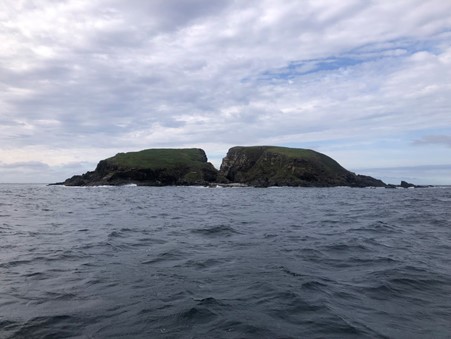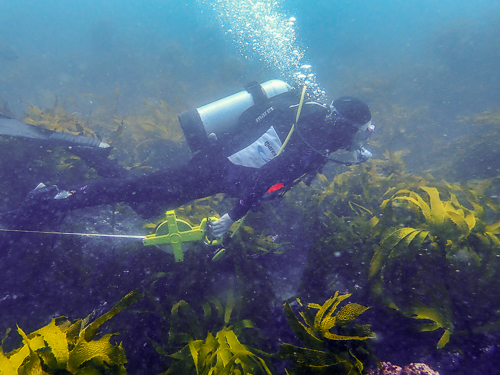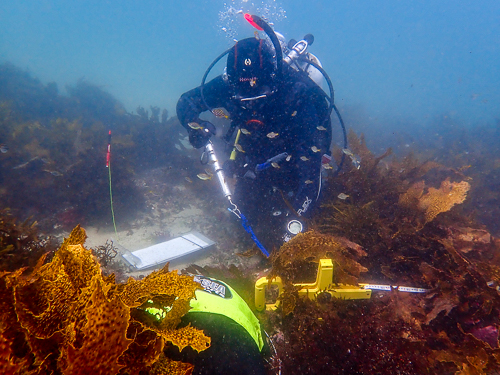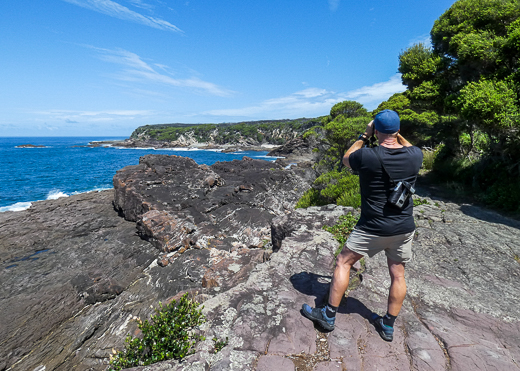Informing the Climate Change Adaptation Strategy
 Climate change risks to Split Solitary Island, and the broader Solitary Islands Marine Park are being assessed to inform on-ground adaptation actions. Photo: Coral Latella, Environment and Heritage Group
Climate change risks to Split Solitary Island, and the broader Solitary Islands Marine Park are being assessed to inform on-ground adaptation actions. Photo: Coral Latella, Environment and Heritage Group
Overview
Why is this project important?
The 2017 NSW Marine Estate Threat and Risk Assessment found climate change to be a key threat to environmental, social, cultural and economic values of our marine and coastal areas in NSW.
We are already seeing the impacts of unprecedented marine heatwaves, storms, bushfires and floods on our NSW coast. For example, the southern shift of marine plants and animals as oceans warm.
Adapting now and preparing for continued changes to our climate is essential so that we can continue to enjoy our precious NSW coast. It will help us minimise harm to important ecosystems, species, infrastructure and industry.
The NSW Climate Change Adaptation Strategy (CCAS) provides a framework that will help us adapt to climate change in NSW, now and over the long term. A key part of the NSW Climate Change Adaptation Strategy is developing a statewide Climate Change Risk and Opportunities Assessment (CCROA). Our role is ensuring marine and coastal information is properly considered as part of this Assessment.
This project aims to help us prepare for climate change and its impact on the NSW coast by:
- Ensuring marine and coastal information is incorporated into the NSW Climate Change Risk and Opportunities Assessment (CCROA).
- Developing Sea Country content for the Adapt NSW website, including information for First Nations people, communities and managers to support on-ground adaptation actions.
- Facilitating climate change adaptation in NSW marine parks through a climate change risk assessment and adaptation toolkit, focusing on Solitary Islands Marine Park.
What have we done so far?
Informing the NSW Climate Change Risk and Opportunities Assessment (CCROA)
Initial steps on incorporating marine and coastal information into the Climate Change Risk and Opportunities Assessment (CCROA) have commenced. An internal project working group has been developed to oversee project progress. Technical reports have been developed to inform the risk assessment framework and guide stakeholder engagement.
Developing Sea Country content for the Adapt NSW website
We are at early scoping stages for developing Sea Country content for the Adapt NSW website. This content will provide examples of the types of climate adaptation actions managers can integrate into marine and coastal management in NSW.
Facilitating climate adaptation in NSW marine parks
To date we have:
- Formed a Statewide Steering Committee (including key marine estate and climate change agencies) and a site-based Technical Working Group. The Technical Working Group includes NSW and local Government staff, representatives from the Solitary Islands Marine Park Advisory Committee and climate change researchers. These groups are reviewing climate change risks and adaptation actions that can be incorporated into marine park planning.
- Developed a draft risk matrix and adaptation toolkit for the NSW marine park network and Solitary Islands Marine Park.
- Incorporated feedback from the Coffs Harbour and District Local Aboriginal Land Council and Aboriginal Elders on the impacts of climate change on cultural values of Solitary Islands Marine Park.
“We’re already seeing the impacts of climate change to our oceans and coasts in NSW. It’s important for us to look at how we can help our precious ecosystems and species to be more resilient and adapt now, before it’s too late.”
Susan Crocetti, Principal Marine Policy Officer – Environment and Heritage Group
Informing the Climate Change Adaptation Strategy is one of several projects funded under the Marine Estate Management Strategy to understand, adapt and increase resilience to help mitigate the impacts of climate change on the NSW marine estate.
Other related projects funded under MEMS include:
Locations
Statewide
Local government areas - Statewide
Lead agency
Office of Energy and Climate Change (Cultural and Ecosystem Adaptation)
Partners
- NSW Department of Climate Change, Energy, the Environment and Water (NSW DCCEEW)
- Department of Primary Industries
- BMT Global (external)
More information
Our Initiatives
Contacts
Project updates
Deep dive on health of NSW coast
18 December 2019

Researchers find climate change indicators
14 May 2020

Keen eyes spot Bull Kelp on the NSW south coast
8 March 2022
